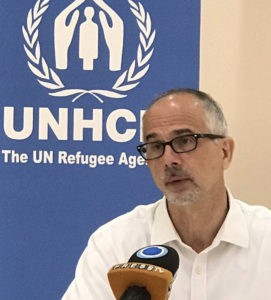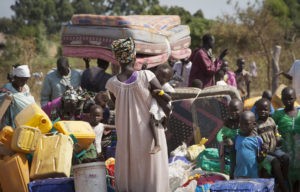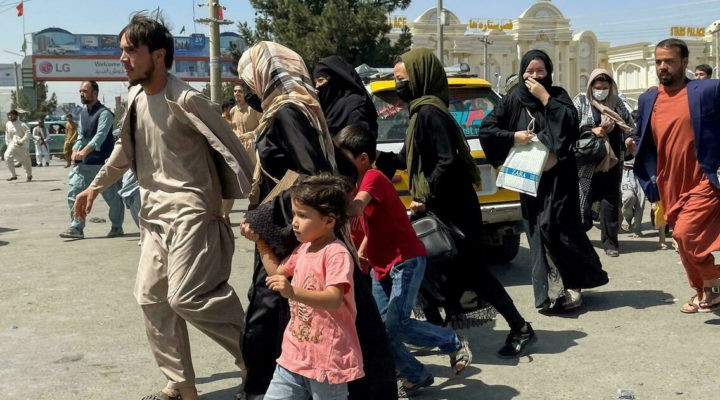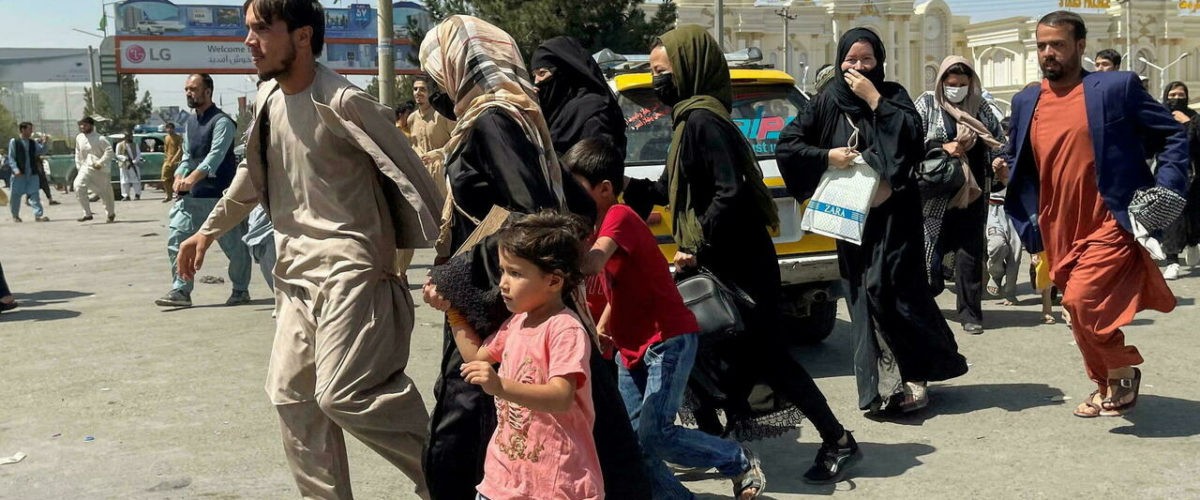As concerns mount across the world over what to do about the increasing number of people fleeing Afghanistan after the country’s government was toppled by the Taliban, the East African nation of Uganda has offered to accommodate 2,000 refugees.
This was disclosed by Esther Anyakun, Uganda’s minister of state for relief, disaster preparedness and refugees. According to Anyakun, the Afghan refugees will be admitted on the request of the United States government in coordination with the United Nations High Commission on Refugees.

Esther Anyakun
“They have requested us to host 2,000 refugees. We are expecting them to be brought in shifts of 500. So, UNHCR secured Imperial hotels in Entebbe as a transit center for them to first of all arrive and be screened,” Anyakun explained.
Days before the announcement, with the situation in Afghanistan still uncertain, Anyakun held talks with the UNHCR country representative to Uganda, Joel Boutroue, on how to “scale up Comprehensive Refugees Response Framework coordination and cooperation with all other refugee agencies in Uganda.”
According to the U.N., “Some 400,000 people have already been displaced by the violence” in Afghanistan this year. “This latest crisis is only adding more suffering to an already tragic situation, in which over 5 million Afghans are displaced in the country and across borders.”
To some observers, that Uganda — a country of 44 million people — opted to welcome the Afghan refugees is not surprising as the country before now has offered asylum to displaced people from the Democratic Republic of Congo, South Sudan and Burundi, countries that have, over the years, experienced conflicts. In regard to migrant and refugees, Uganda is considered a beacon by the U.N.

Joel Boutroue
In a recent interview, Boutroue disclosed that Uganda hosts an estimated 1.5 million refugees, spread across 13 districts, and went further to thank the Ugandan people for their hospitality: “I would like to say a big thank you to the Ugandans for their generosity in hosting refugees and sharing their resources. They understand that anybody can be a refugee. My gratitude goes also to the government of Uganda for being insightful, by including refugees as part of their development plans.”
A Global Trends report places Uganda, alongside Pakistan, as among the top-five refugee-hosting countries in the world. Top on the list is Turkey, which hosts the largest number of refugees with just under 4 million, most of whom were displaced by the war in Syria.
The expected arrivals from Afghanistan will swell the number of refugees in Uganda, the East African country headed by Yoweri Museveni.
A Global Trends report places Uganda, alongside Pakistan, as among the top-five refugee-hosting countries in the world.
An Aug. 17 statement by Uganda’s Ministry of Foreign Affairs noted that the country “joined the international community on calling upon all those in power and authority in Afghanistan to protect life, property and restore security and civil order in the country.” In view of its history of hosting refugees and people in need, Uganda agreed to provide “assistance including temporary hosting of some of the affected persons in the current crisis.”
At about the same time that Uganda was announcing its willingness to accept Afghan refugees, South Africa made public its plans to evacuate its citizens from Afghanistan. A statement by the country’s Department of International Relations and Cooperation, while urging “all Afghan parties involved in the internal conflict to ceaselessly search for a solution through dialogue, restoration of stability and an orderly transition to a new government,” disclosed that the South African High Commission in Islamabad, Pakistan, is in contact with a number of South African nationals based in Afghanistan to ensure their safety and provide them necessary consular assistance.
Beyond granting asylum to Afghan refugees or concerns about safety of Africans living in Afghanistan is the worry or significance of the Taliban victory to radical or insurgent groups in Africa who share the same or similar ideology as the Taliban. These includes terrorist organizations like al-Shabaab and Boko Haram, groups that, to this day, aspire to take over the governments of Somalia and northern Nigeria — two of a number of countries or regions they operate in for the purpose of establishing Sharia rule like the Taliban did in the past in Afghanistan and has now reimposed in the country upon recently seizing power.

In this Jan. 6, 2014, file photo, refugees who fled violence in South Sudan and crossed the border into Uganda arrive and await transportation from a transit center in the town of Koboko, Uganda. More than one million refugees had fled South Sudan’s ongoing civil war, overwhelming aid agencies and creating one of the world’s worst humanitarian disasters. The United Nations said Sept. 16, 2016 that South Sudan joins Syria, Afghanistan, and Somalia as countries that have produced more than 1 million refugees. (AP Photo/Rebecca Vassie)
Clashes between security forces and the two groups, designated as terrorist organizations by the U.S. Department of State and believed to have ties with global jihadist networks like al-Qaeda and the Islamic State, have cost their countries dearly in human and material terms. According to a June 2021 Reuters report quoting the United Nations Development Program, “Northeast Nigeria’s conflict with Islamist insurgencies had killed nearly 350,000 people as of the end of 2020.” It further noted that “Nigeria’s war with Islamist insurgencies Boko Haram and Islamic State’s West Africa Province has spawned one of the world’s worst humanitarian crises, with millions of people dependent on aid. The conflict shows little sign of ending.”
According to a Voice of America report, “More than 4,000 civilians have been killed in al-Shabaab attacks since 2010, according to records compiled by the independent group Armed Conflict, Location and Event Data Project, or ACLED. The majority of the deaths were in Somalia — where the population is almost entirely Muslim — with smaller numbers stemming from attacks in Kenya, Uganda and Djibouti. More than 3,000 of the deaths have occurred since 2015.”
The death and destruction in Somalia comes in spite of the presence of a peacekeeping force — African Union Mission in Somalia, a continental security team backed by the United Nations Security Council. It was created by the African Union’s Peace and Security Council on Jan. 19, 2007, with an initial six-month mandate, but due to the unending violence and fragile peace in the East African country, the mandate of the peacekeepers has been regularly extended via various U.N. Security Council resolutions.
Anthony Akaeze is a Nigerian-born freelance journalist who currently lives in Houston. He covers Africa for BNG.
Related articles:
‘Humanitarian catastrophe’ unfolding in Afghanistan
Afghanistan: A tragic example of an unjust war | Analysis by Chris Conley
Blame me for the situation in Afghanistan | Opinion by Craig Nash
Afghanistan and America: Bloodlust and the failure of prophetic imagination | Opinion by Wendell Griffen


